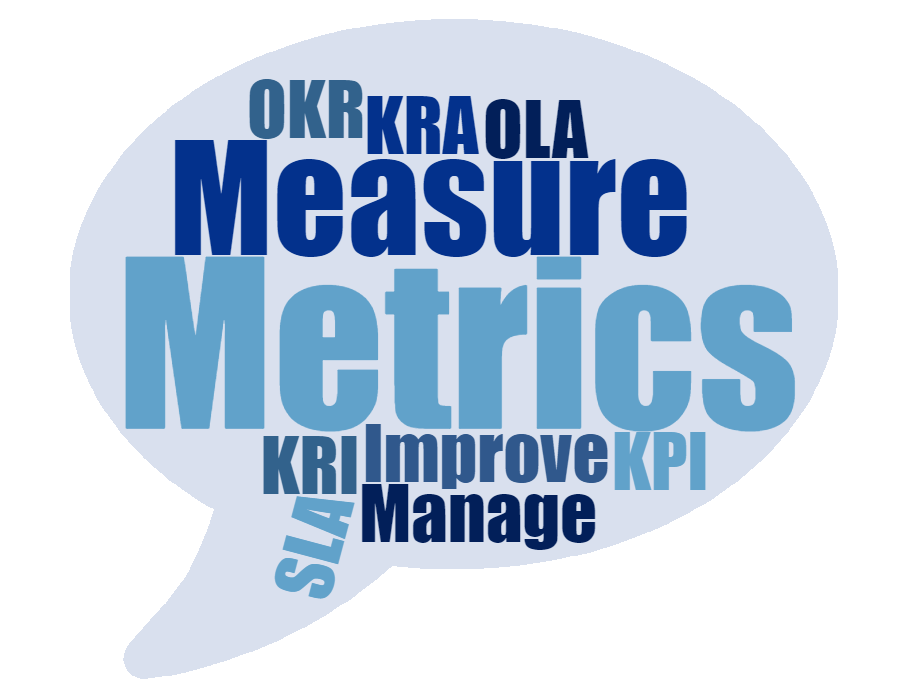 KRIs, KPIs, KRAs, SLAs, OLAs, a smorgasbord of three letter acronyms, all intending to provide meaningful measurement of performance and delivery.
KRIs, KPIs, KRAs, SLAs, OLAs, a smorgasbord of three letter acronyms, all intending to provide meaningful measurement of performance and delivery.
But have we reached the point of metrics madness?
Some time ago I was talking with a colleague who told me that he spent several hours every month reviewing a 50+ page powerpoint deck of metrics with his peers. A new member of the management team queried the meaning of one of the metrics some way into the deck, and the result was quite a lot of head-scratching. The development of that metrics deck had become an organisational habit, without sufficient analysis of that habit to determine whether it was still beneficial. To use another food analogy, eating is necessary and good, eating too much leads to unwanted bloat and weight gain.
Peter Drucker is often quoted as having said “If you can’t measure it, you can’t manage it.” Apparently, he never did. The original quote is attributed to Lord Kelvin. He liked to measure things so much that he has his own scale for recording temperature (the 19th century equivalent of having your own reality show). It is quoted as:
“I often say that when you can measure what you
are speaking about, and express it in numbers, you
know something about it; but when you cannot
measure it, when you cannot express it in numbers,
your knowledge is of a meagre and unsatisfactory
kind..”
So, some really smart people agree on the value of measurement. As a proto-scientist (because I didn’t do a Ph.D. my wife calls me a “scientician”) I was also taught the value of recording numerical observations and data of experiments. I firmly believe that numerical, fact-based data is a really useful way to understand (parts of) the world.
That said, I think we may be hitting “peak metric” in certain areas. As I’ve mentioned in a previous LinkedIn post, when I heard Jason Fried describe his “no goals, no metrics” view, I have to say I was partially intrigued and partially aghast – like a vegetarian who accidentally eats meat for the first time and discovers they like it (ok, I should probably go and get some dinner, or the food analogies will continue).
I think there’s an important nuance here though. There are certain metrics which to most businesses are absolutely critical; they measure things like customer acquisition and retention, cross-selling, product delivery, customer satisfaction, revenue and profit generation. Things that matter to the core of the business, and which create blind spots and failure if ignored.
SLAs, while often used to manage contracts with customers for services provided are, to my mind, not worth the paper they are written on. Once you’ve gotten to the point of SLA breach and subsequent penalties, at least one party is considering how to exit the contract and there are unhappy users in abundance.
And then there are the metrics that flourish in the land of good intentions. The sort of metric that tells you how hot it is in your kitchen when your house is on fire. Or that tells you your car emissions are x grams of C02 per kilometer, but you can’t find out how much fuel you have left in your tank.
You don’t really care if your kitchen is at wallpaper-stripping temperatures if your house is ablaze. It’s a metric that will never have value. And yet, it has plenty of cousins in the corporate world today, buried in 50 page slide decks that benefit no-one.
My father-in-law is 90, and a wonderful man. To my enduring chagrin, at certain points in the year (when I’m travelling) he comes to my house and prunes the apple tree in the garden. He climbs on my neighbour’s shed, like the world’s most antiquated tyke, and removes the dead wood and unhelpful greenery from my apple tree. He calls this “hard pruning”, which always causes my brother-in-law to crack up. Because of my father-in-law’s approach, I get apples every year – the whole purpose of a domestic apple tree.
I think we need to consider metrics in a similar way. First focus on the things that matter most to our customers, and then aggressively prune the elements that don’t contribute to a healthy crop of fruit.
|
|

